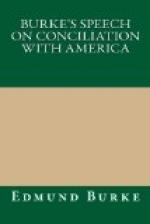[Footnote: 10. the noble lord in the blue ribbon Lord North (1732-1792) He entered Parliament at the age of twenty-two, served as Lord of the Treasury, 1759; was removed by Rockingham, 1765; was again appointed by Pitt to the office of Joint Paymaster of the Forces, became Prime Minister, 1770, and resigned, 1781 Lord North is described both by his contemporaries and later histonaus as an easy-going, indolent man, short-sighted and rather stupid, though obstinate and courageous. He was the willing servant of George iii, and believed in the principle of authority as opposed to that of conciliation. The blue ribbon was the badge of the Order of the Garter instituted by Edward iii Lord North was made a Knight of the Garter, 1772. Burke often mentions the “blue ribbon” in speaking of the Prime Minister. Why?]
[Footnote: 11. Colony agents. It was customary for colonies to select some one to represent them in important matters of legislation. Burke himself served as the agent of New York. Do you think this tact accounts in any way for his attitude in this speech?]
[Footnote: 12. our address Parliament had prepared an address to the king some months previous, in which Massachusetts was declared to be in a state of rebellion. The immediate cause of this address was the Boston Tea Party. The lives and fortunes of his Majesty’s subjects were represented as being in danger, and he was asked to deal vigorously not only with Massachusetts but with her sympathizers.]
[Footnote: 13. those chances. Suggested perhaps by lines in Julius Caesar, IV., iii., 216-219:—
“There is a tide
in the affairs of men,
Which, taken at the
flood, leads on to fortune;
Omitted, all the voyage
of their life
Is bound in shallows
and in miseries.”]
[Footnote: 14. according to that nature and to those circumstances. Compare with 8. Point out the connection between the thought here expressed and Burke’s idea of “expediency.”]
[Footnote: 15. great consideration. This paragraph has been censured for its too florid style. It may be rather gorgeous and rhetorical when considered as part of an argument, yet it is very characteristic of Burke as a writer. In no other passage of the speech is there such vivid clear-cut imagery. Note the picturesque quality of the lines and detect if you can any confusion in figures.]
[Footnote: 16. It is good for us to be here. Burke’s favorite books were Shakespeare, Milton, and the Bible. Trace the above sentence to one of these.]
[Footnote: 17.
“Facta
parentun
Jam legere et quae sit
poteris cognoscere virtus.”
—Virgil’s
Eclogues, IV., 26, 27]
Notice the alteration. Already old enough to study the deeds of his father and to know what virtue is.
[Footnote: 18. before you taste of death. Compare 16.]
[Footnote: 19. Roman charity. This suggests the more famous “Ancient Roman honor” (Merchant of Venice, iii., 11, 291). The incident referred to by Burke is told by several writers. A father condemned to death by starvation is visited in prison by his daughter, who secretly nourishes him with milk from her breasts.]




